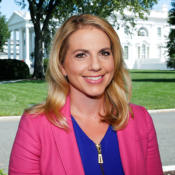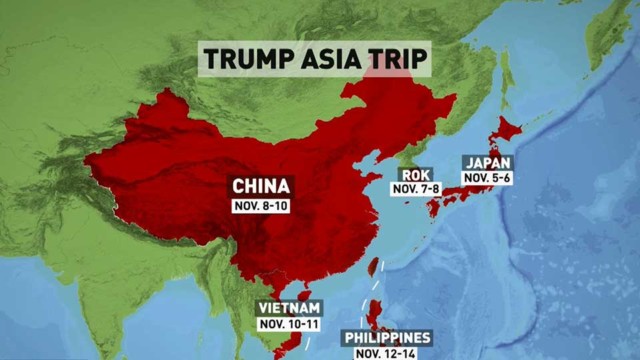U.S. President Donald Trump departed on his first trip to the Asia-Pacific, but announced a slight change in plans before leaving.
CGTN’s Jessica Stone reports.
Boarding Marine One prior to heading out for his trip to Asia, President Trump announced he will stay an extra day in the Philippines to attend the leaders’ meeting of the East Asia Summit.
“We’ll be talking about trade. We’ll be talking about obviously North Korea,” Trump said. “We’ll be enlisting the help of a lot of people and countries and we’ll see what happens. But I think we’re going to have a very successful trip.”
A Korean Embassy official told CGTN “his [Trump’s] attendance is very good news, not only for ROK, but for all our friends in Southeast Asia.”
The White House said this is the longest trip to the region by a U.S. president in more than a quarter century. The journey begins in the U.S. state of Hawaii, and then Trump continues on to Japan and several others countries for varying events:
- Republic of Korea – state visit and a major speech on DPRK denuclearization before the national assembly
- China – state visit with the main focus on trade and the DPRK
- Vietnam – major speech on regional trade at APEC
- Philippines – visit with President Duterte and attending the US ASEAN Summit and the East Asia Summit
When it comes to the DPRK nuclear issue, U.S. National Security Adviser H.R. McMaster signaled that Trump will try to rally the international community to join the sanctions effort. He will also ask Beijing to use more of its influence.
“China is definitely doing more, but obviously it’s not enough until all of us have denuclearization,” McMaster said.
Cui Tiankai, the Chinese Ambassador to the U.S., is in return asking Washington to do its part, including by calming the rhetoric from the White House.
“it’s clear that, if only China is making its best efforts and others are doing things that could lead to escalation of tension, this issue will not be solved,” Cui said.
Just before Trump took off on his trip, the U.S. Treasury Department formally blocked the Chinese Bank of Dandong from the U.S. financial system. Washington accuses the bank of providing a gateway for financing Pyongyang’s illegal nuclear weapons program.
 CGTN America
CGTN America

